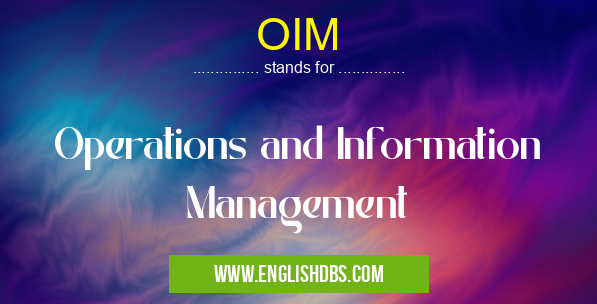What does OIM mean in MANAGEMENT
Operations and Information Management (OIM) is an approach to management that focuses on aligning information resources with operational processes. OIM involves managing the data, systems, and processes used in day-to-day operations such as order processing, financial reporting, customer relations management, inventory control, and so forth. It is an integrated approach that combines data analysis, technology implementation, and process improvement to create a system that optimizes the effectiveness of the organization's operations while reducing costs.

OIM meaning in Management in Business
OIM mostly used in an acronym Management in Category Business that means Operations and Information Management
Shorthand: OIM,
Full Form: Operations and Information Management
For more information of "Operations and Information Management", see the section below.
» Business » Management
Essential Questions and Answers on Operations and Information Management in "BUSINESS»MANAGEMENT"
What is Operations and Information Management?
Operations and Information Management (OIM) is an interdisciplinary field that focuses on the design, management, and improvement of processes, products, services, and technologies to help organizations achieve their strategic objectives. It combines operations research, information systems and technology management in order to identify, develop and implement strategies for achieving organizational success.
What are the important skills needed in OIM?
OIM professionals must have a broad knowledge base ranging from problem analysis to process improvement as well as excellent critical thinking skills. They should be knowledgeable in using different tools such as spreadsheets, data visualization techniques like Gantt charting or PERT diagrams and use statistical methods such as linear programming in order to assess scenarios or forecast outcomes. Furthermore they should be comfortable with managing various IT projects to ensure coordination among different teams involved in the process.
How does OIM relate to other disciplines?
OIM has strong connections with a variety of disciplines including industrial engineering, finance, accounting, marketing and human resources. It leverages concepts from all these areas in order to effectively analyze problems and streamline processes within an organization.
What do OIM professionals do?
OIM professionals are responsible for improving operations performance by utilizing existing resources more efficiently while also ensuring desired outcomes are achieved. They might recommend cost-cutting measures or suggest inventory optimization strategies to enhance productivity and reduce waste. Additionally they may employ Lean Six Sigma principles or utilize project management tools like Agile methodology for attaining organizational goals faster.
What qualifications are required for an OIM career?
Generally speaking a Bachelor's degree in Business Administration or related disciplines would be sufficient although further qualifications can give you an edge over the competition when applying for managerial positions. Those looking at getting into a specialized area may require advanced degrees such as a Master’s degree or even a Doctoral degree depending on their chosen career path within the discipline.
Where is this field applied?
OIM principles have been used across diverse industries ranging from manufacturing to healthcare with implementation occurring at both operational level as well as strategic level according to needs identified by business leaders within each sector like increased customer satisfaction or better cost control mechanisms etcetera.
Final Words:
In conclusion Operations and Information Management (OIM) is an important tool for organizations to have at their disposal to increase productivity while reducing costs. With OIM methods in place companies can analyze their existing system setup while making improvements based off of those findings all the while still utilizing their current technology capabilities. By combining data analysis with process improvement along with technology implementation organizations can create a more effective operation which will add significant cost savings over time without sacrificing quality output.
